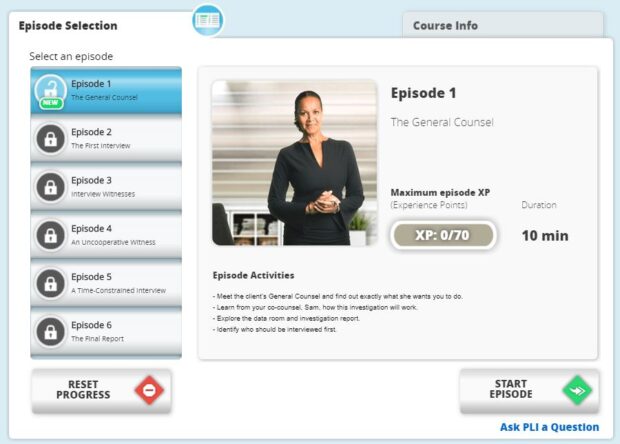 Look back on your learning experiences as a lawyer-in-training. Did you retain more information by listening in a large lecture hall, or by practicing your skills in a smaller seminar or clinic?
Look back on your learning experiences as a lawyer-in-training. Did you retain more information by listening in a large lecture hall, or by practicing your skills in a smaller seminar or clinic?
Researchers who specialize in learning science have found that people learn better when they can interact meaningfully with the material. This is as true for CLE as it is in law school.
That’s where the Practising Law Institute’s Interactive Learning Center (ILC) comes in. In 2012, we began consulting with learning development firms around the world and building an in-house team of specialists focused on instructional methodologies and how people learn. Drawing from the fields of cognitive psychology, neuroscience, instructional design and education, our ILC team is dedicated to producing cutting-edge CLE programs built on a learning science foundation.
Today, the ILC offers 18 e-learning titles, most of which are available on-demand, and our programs have been recognized with eight industry awards from both inside and beyond the legal education profession.
But we don’t rest on our laurels. Our Research & Development team keeps up with the latest technologies to improve and innovate our content delivery. We develop games, simulations and scenario-based programs in order to provide a healthy dose of “learning by doing” interactivity along with compelling narratives. Beyond upping the engagement, these programs are shown to transfer more effectively to the real world – that is, they serve as rehearsals for actual legal conversations and decision-making.
For example, two “serious games” and two “simulations” offer immersive, first-person, role-playing experiences – a big leap from traditional CLE.
Consider our Financial Statement Basics game, which teaches the ins and outs of a financial statement. While essential, this type of information can be dry and difficult to process. Our interactive program uses a fictional premise that has the learner evaluate several businesses for an M&A deal. Over the course of 90 minutes, participants work to peel back the secrets behind the numbers in a financial statement. Your challenge is to help the client, and this involves dissecting numbers, interviewing some off-the-wall CFOs, and identifying red flags The aim is to entertain as well as inform.
On an equally serious but different topic, an Internal Investigation game has the learner investigate allegations of sexual harassment against a company executive.
Participants, playing the role of outside counsel, conduct interviews with company employees and make a report to the general counsel.
Two of our simulations immerse learners into preparing and then conducting a negotiation on an intellectual property matter.
Other programs are more of a hybrid, combining instructional segments led by a lawyer-faculty member with scenario-based experiences that require responses and deep thinking about what was just observed. These scenarios include professionally produced video story lines that have a “soap opera” feel.
Legal expertise for PLI’s interactive programming is usually drawn from our deep bench of renowned and experienced faculty, but for a program on ethics in the legal profession, we tapped two leading law school faculty.
Our Motivated Reasoning and Legal Ethics program offers a deeper dive into the concepts that underpin why lawyers might be tempted to take less-than-ethical positions, such as inflating client billing in response to pressure from a senior partner. The faculty worked with the development team to illustrate concepts via animations and helped script fictional lawyers faced with ethical quandaries. We know that ethics credits can be hard to come by, and our team enjoys pulling together useful programs that spark discussion and insights.
For busy lawyers, no amount of fun, effective learning will be worth it if CLE credit can’t be earned. In fact, in an industry that has for years accredited lecture-based programs almost exclusively, PLI has led the charge on urging regulators nationwide to approve non-traditional CLE experiences.
Eight years in, our Interactive Learning Center’s product pipeline is full, including an upcoming program on informal legal writing that will offer guidance and practice on using digital communication tools wisely. Also in development is an unusual program built around the learner acting as a consultant on a new legal drama ‒ while making sure that diversity and inclusion issues are addressed in the fictional law firm. The program, slated for a 2021 release, will offer specialty credit in the diversity category now required by many state regulators.
Learn more about how the ILC can enhance your learning and level up your CLE compliance. Visit our ILC webpage for links to current and upcoming programs, including several that can help you hone pro bono skills to serve clients in need.
 Practising Law Institute is a nonprofit learning organization dedicated to keeping attorneys and other professionals at the forefront of knowledge and expertise. PLI is chartered by the Regents of the University of the State of New York and was founded in 1933 by Harold P. Seligson. The organization provides the highest quality, accredited, continuing legal and professional education programs in a variety of formats which are delivered by more than 4,000 volunteer faculty including prominent lawyers, judges, investment bankers, accountants, corporate counsel, and U.S. and international government regulators. PLI publishes a comprehensive library of Treatises, Course Handbooks, Answer Books and Journals also available through the PLI PLUS online platform. The essence of PLI’s mission is its commitment to the pro bono community. View PLI’s upcoming live webcasts here.
Practising Law Institute is a nonprofit learning organization dedicated to keeping attorneys and other professionals at the forefront of knowledge and expertise. PLI is chartered by the Regents of the University of the State of New York and was founded in 1933 by Harold P. Seligson. The organization provides the highest quality, accredited, continuing legal and professional education programs in a variety of formats which are delivered by more than 4,000 volunteer faculty including prominent lawyers, judges, investment bankers, accountants, corporate counsel, and U.S. and international government regulators. PLI publishes a comprehensive library of Treatises, Course Handbooks, Answer Books and Journals also available through the PLI PLUS online platform. The essence of PLI’s mission is its commitment to the pro bono community. View PLI’s upcoming live webcasts here.


